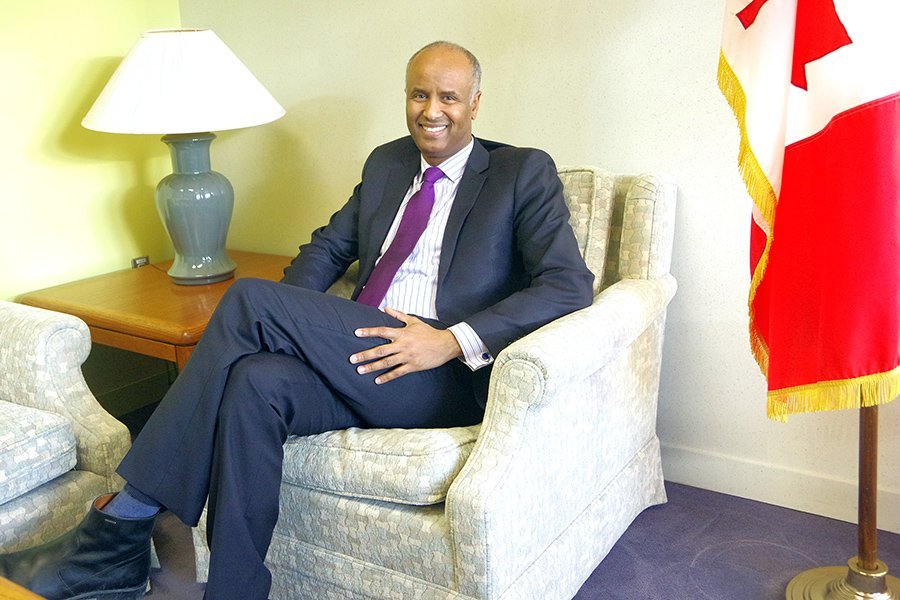
Martin C. Barry
With predictions being made that immigration will rank high among the issues in the upcoming federal election, Immigration, Refugees and Citizenship Minister Ahmed Hussen says he is prepared to defend the Liberal government’s policies, while setting the record straight with regard to “misinformation” he says has been spread by the Conservatives.
A hot topic
Prime Minister Justin Trudeau warned recently that Canadians should be wary of fear-mongering about immigration, suggesting the issue will be a hot-button topic before the federal election in the fall.
The Conservative Party, currently in second place in Canadian voters’ intentions, has adopted a moderate stance on the issues – criticizing aspects of Liberal policies for the most part, with some more extreme points of disapproval in some cases.
However, recent poll numbers also suggest that there is at least some support out there for more radical views being expressed by Maxime Bernier’s People’s Party, such as reducing immigration numbers and emphasizing Canadian values.
Tory allegations
In an otherwise routine interview recently in Montreal with Newsfirst Multimedia, Minister Hussen lit up with emotion as he reacted to allegations made by the Tories regarding Liberal Immigration Ministry policies. “The Conservatives have not been forthright about certain things,” he said.
Recalling the United Nations’ Global Compact for Migration, a non-binding international agreement enacted by the UN in December last year, Hussen defended Canada’s decision to endorse the treaty, while denouncing the Conservatives’ response to the Liberals’ course of action.
“Canada agreed to it because it’s a non-binding treaty – it’s a framework,” said Hussen. “It allows countries to work together on immigration issues to deal with the challenges of irregular migration, but also to harness the good things about regular migration.
Defends Liberals
“One of the things in that agreement says that it allows countries to come together to work more closely to facilitate and make it easier to recognize each other’s credentials. That’s a good thing, right? You know what the Conservatives did? They came out and they lied about the agreement.”
Hussen maintains that Conservative leader Andrew Scheer held a press conference in Ottawa “where he said that the UN Global Compact on Migration will result in Canada giving up sovereignty and control of our own immigration system to the UN.”
According to a Canadian Press report of that media event held last December in the nation’s capital, Scheer did, in fact, come out strongly opposing the UN Global Compact, saying at the time, “Canadians and Canadians alone should make decisions on who comes into our country and under what circumstances.”
‘Misinformation,’ says Hussen

Hussen responded in our interview, “Even though the agreement clearly says this agreement is non-binding, this agreement does not take away control over a country’s immigration system, even though it’s clearly stated they went out and spread misinformation.
“So the Conservatives have repeatedly misinformed Canadians about the Global Compact – about all these different issues,” said Hussen. “That’s the challenge we’re having. It’s one thing to debate policy.
“But if someone is completely making up facts about the Global Compact – which I believe is in Canada’s interest – how do you deal with that? It’s somebody basically spreading fear, about something that doesn’t exist, to the Canadian population. We believe that’s not the responsible thing to do and it’s not what leadership is about.”
CAQ’s Bill 9
In Quebec, the CAQ government led by Premier François Legault is preparing to table Bill 9, a sweeping piece of legislation that will include a clause allowing provincial immigration authorities to throw out 18,000 immigration applications that are backlogged. The federal government has a stake in the matter, in that ultimately only Ottawa holds the power to declare immigrants permanent residents (rather than Quebec).
“Bill 9 needs more study,” said Hussen, adding that he couldn’t comment in detail as his department is actively working on the file.
However, he acknowledged that dealing with the matter will involve revisiting some key agreements and pieces of legislation, such as the Canada–Québec Accord relating to Immigration and Temporary Admission of Aliens as well as the Immigration and Refugee Protection Act.
Has good rapport
While insisting that current day-to-day relations on immigration between Quebec and Ottawa are “really good, I have no complaints about that, and we’re very thankful to Quebec – they’re a very close partner – we don’t have any friction,” Hussen continued, “Bill 9 is a concern. But we need to study exactly how it’s going to apply to the various categories of immigrants and how it’s going to unfold.
“That’s still not clear – even in Quebec. Those conversations are ongoing. So we will need to do our analysis in Ottawa obviously by talking to the government of Quebec, as well, and then determining where we stand.”
But Hussen admitted this much: “Our position on conditional permanent residency is that we don’t like conditional permanent residency. We removed conditional permanent residency that the Harper government imposed on women.”



